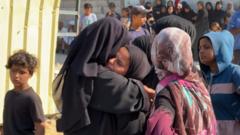In a significant response to escalating global calls for assistance, Israel has unveiled plans to open humanitarian corridors and allow air drops of aid into Gaza, a move aimed at alleviating the deepening crisis in the region where starvation is reported.
Israel Establishes Humanitarian Corridors to Facilitate Aid to Gaza

Israel Establishes Humanitarian Corridors to Facilitate Aid to Gaza
As international pressure mounts, Israel announces plans for humanitarian aid delivery amid warnings of starvation in Gaza.
Israel's Defense Forces (IDF) stated on Saturday that they are set to implement humanitarian corridors for UN convoys, facilitating the transport of essential supplies into Gaza. The IDF confirmed that initial air drops had taken place, delivering seven pallets of flour, sugar, and canned goods provided by various international organizations. This effort follows growing concerns raised by aid groups indicating that without proper intervention, mass starvation could ensue and civilians are already facing dire conditions.
With this announcement, Israel seeks to mitigate the mounting international criticism regarding its humanitarian stance in Gaza. The IDF emphasized their commitment to enhancing the humanitarian response, preparing to enact temporary pauses in areas densely populated by civilians. They have contested accusations of intentionally causing starvation and redirected responsibility for food distribution to UN organizations and international aid providers, insisting that aid must not be diverted to Hamas.
Amidst Israel's ongoing blockade that commenced in March, the United Nations and humanitarian agencies have placed blame on the Israeli government for the worsening situation, urging for the unhindered passage and distribution of aid supplies. Meanwhile, the health ministry in Gaza reported that over 125 individuals, including a significant number of children, have succumbed to malnutrition-related causes.
Israel has resumed limited power supply to a desalination plant expected to assist approximately 900,000 residents, further indicating a limited expansion in efforts to address the humanitarian crisis caused by the ongoing conflict.
With this announcement, Israel seeks to mitigate the mounting international criticism regarding its humanitarian stance in Gaza. The IDF emphasized their commitment to enhancing the humanitarian response, preparing to enact temporary pauses in areas densely populated by civilians. They have contested accusations of intentionally causing starvation and redirected responsibility for food distribution to UN organizations and international aid providers, insisting that aid must not be diverted to Hamas.
Amidst Israel's ongoing blockade that commenced in March, the United Nations and humanitarian agencies have placed blame on the Israeli government for the worsening situation, urging for the unhindered passage and distribution of aid supplies. Meanwhile, the health ministry in Gaza reported that over 125 individuals, including a significant number of children, have succumbed to malnutrition-related causes.
Israel has resumed limited power supply to a desalination plant expected to assist approximately 900,000 residents, further indicating a limited expansion in efforts to address the humanitarian crisis caused by the ongoing conflict.


















